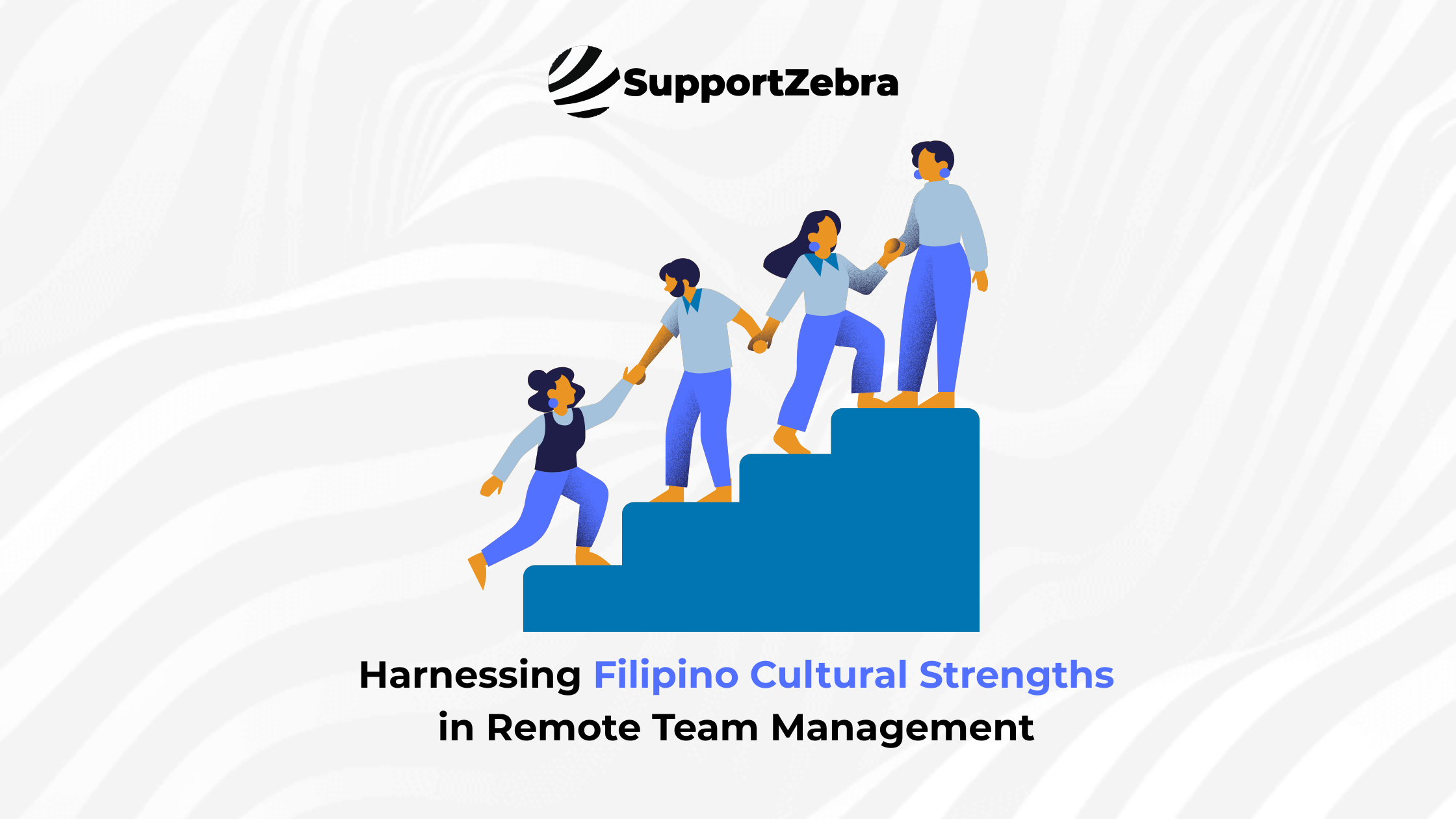How Filipino Culture Can Supercharge Your Remote Workforce
-
Filipino cultural values like hospitality, resilience, and the Bayanihan spirit foster teamwork, trust, and collaboration in remote teams.
-
Embracing unique communication styles and building strong personal relationships enhance harmony and productivity in virtual settings.
-
Celebrating achievements, promoting inclusivity, and offering mentorship boost motivation and professional growth.
-
SupportZebra helps companies harness Filipino cultural strengths to create engaged, high-performing remote teams.
What allows a remote team to succeed in our connected world today? As more companies depend on virtual teamwork, tapping into cultural strengths is crucial for managing teams effectively.
The Filipino culture, known for its strong values of hospitality, resilience, and close community bonds, provides distinct benefits that can improve the functioning of a remote team. By recognizing and incorporating these cultural characteristics, businesses can create a more unified team atmosphere and fully leverage the capabilities of their Filipino employees, boosting productivity and creativity on a global scale.
Understanding Filipino Values
Understanding and embracing Filipino culture can boost collaboration and teamwork in your remote team. Essential values like hospitality, resilience, and strong family connections are crucial to building a supportive environment. The Bayanihan spirit, representing community support, encourages team members to strive for shared goals, while pakikisama fosters open communication and respect among everyone.
Filipinos are known for their incredible resilience when facing challenges, making them perfect for fast-paced work environments. By tapping into these cultural strengths, you can cultivate a supportive atmosphere that promotes innovation and success in your remote teams.
Emphasizing Bayanihan Spirit
The Bayanihan spirit, meaning “hero,” represents the core values of teamwork and community in Filipino culture. Consider boosting collaboration with virtual team-building exercises to promote this spirit among your remote teams.
Set a good example, promote open dialogue, acknowledge individual contributions, share knowledge, and participate in community service. These approaches can create a united and driven team that genuinely appreciates the importance of unity and collaboration.
Leveraging Communication Styles
Grasping the distinct ways your Filipino coworkers communicate can boost your remote interactions. Filipinos communicate more indirectly and often depend on non-verbal signals, using gentle hints to keep social harmony intact.
To improve communication in your remote team, encourage open discussions, be mindful of non-verbal cues, practice patience, use straightforward and respectful language, and invest time in building relationships. Understanding and adjusting to these communication styles can enhance teamwork and create a more welcoming remote work environment.
Building Strong Relationships
Building strong personal relationships and trust is essential in Filipino culture, especially for remote teams to succeed. You can boost these connections by setting up virtual coffee breaks, storytelling sessions, online games, cultural festivities, karaoke nights, and recognition programs.
These activities can create a positive remote work atmosphere that showcases Filipino values, improving team dynamics and overall performance. Focusing on these approaches will help you develop loyalty, community support, and a teamwork culture.
Encouraging Inclusivity and Diversity
Filipino culture values inclusivity and diversity, focusing on social harmony and working together. To make your remote teams more inclusive, you should promote understanding of different cultures, encourage open conversations, start diverse projects, celebrate cultural events, set up mentorship programs, and create a supportive environment. By appreciating everyone’s contributions, you can boost teamwork and creativity while reflecting the core values of Filipino culture.
Recognizing and Celebrating Achievements
Celebrating achievements is a big part of Filipino culture and helps build a sense of community and thankfulness. Recognizing both team and individual contributions makes everyone feel valued and connected.
In a remote work environment, you might think about hosting online recognition events, giving personalized shout-outs, handing out digital badges, sharing regular updates, sending small gifts, or organizing virtual parties and themed events. These ideas can enhance motivation and reinforce cultural values, making the remote team more engaged and effective.
Providing Support and Mentorship
In Filipino culture, mentorship is vital to personal and professional growth. Supporting and strengthening ties to your organization’s mission is essential in remote work.
To develop effective mentorship programs, set clear objectives, use technology, and create straightforward guidelines. Encourage frequent meetings, foster an open conversation environment, celebrate accomplishments, and promote peer mentoring. These approaches will help build trust and teamwork, enhancing the professional growth of your remote employees while highlighting the importance of community and collaboration.
Adapting Management Styles
Adjusting your management approach to align with Filipino cultural values is essential to getting the most out of your remote teams. Team members do better when leaders emphasize shared leadership and include everyone in decision-making. Consider using participative management, servant leadership, and fostering open communication.
Regularly recognizing achievements, providing feedback, offering flexible work arrangements, setting team-based performance goals, and promoting continuous learning can also be beneficial. By embracing these strategies, you can build a work environment that respects Filipino cultural values and boosts performance and collaboration in remote teams.
Embracing Filipino Culture for Remote Team Success
Managing a remote team while embracing Filipino culture can be rewarding. Recognizing strong family ties, warm hospitality, and effective communication fosters a supportive workplace. Building relationships, celebrating achievements, and providing growth opportunities resonate with Filipino professionals, boosting motivation. Understanding cultural nuances, such as respect for authority and English usage in business, enhances teamwork and creates a positive environment. By integrating these insights, companies can leverage Filipino culture to drive innovation and achieve global success.
At SupportZebra, we specialize in managing remote teams in the Philippines and understanding their unique culture and work habits. We prioritize strong relationships, open communication, and a positive workplace to ensure our team members feel valued and motivated. By establishing clear communication standards, building trust, and offering flexible hours, we help our remote teams thrive.
Contact SupportZebra today to enhance your remote team management and leverage our expertise in Filipino culture.

